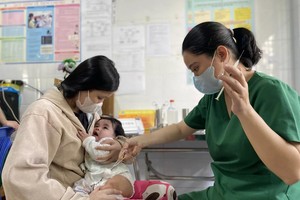HCM CITY (VNS) — Many families in Viet Nam who seek health remedies on online forums and websites have failed to check the accuracy of the information, leading to serious illnesses, and in some cases, death.
On July 2, six-year-old Tran Phuong Nam of Dong Nai Province, who had diarrhoea, was brought to Dong Nai Paediatrics Hospital for emergency aid because of severe dehydration. His mother, Nguyen Ngoc Phuong, had followed a remedy she had read about on an online forum.
It had recommended a strict regimen with thin rice gruel and salt, and no medicine of any kind, for one week. Five days later, Nam was severely dehydrated.
After a 10-day stay at the hospital, the boy's health recovered.
Hospital doctors said that he would have died from dehydration if the parents had brought him to the hospital a day later.
Similarly, during a measles outbreak earlier this year, a misleading remedy found online suggested the use of coriander.
Many parents bought the herb, boiled it in water and bathed their children in it. However, their children's health became worse.
Dr Truong Huu Khanh, head of the HCM City Peadiatric Hospital No.1's neurology and infectious diseases ward, said the herb was not useful and that parents must be more careful about listening to rumours about health cures on social media sites and internet forums or through word-of-mouth.
Using these inaccurate remedies could lead to missing the optimal period to treat the disease properly, Khanh said.
Tran Van Dau of Vung Tau City, who had cirrhosis of the liver due to alcoholism, was another unsuspecting patient.
He said he had heard about a wonderful remedy offered by a monk from Binh Thuan's Ham Tan District, who had offered him a variety of herbal medicine.
For the first month, he felt better, but then he became worse. Doctors at Vung Tau City's hospital said he was seriously ill. He died after a two-day stay at the hospital.
Like Dau, many people have discovered diet fads and miracle treatments through online forums and websites and by word-of-mouth.
Organic rice, for example, has been touted as a treatment for HIV and cancer, and red bran rice a cure for diabetes, gout and other diseases.
"Some people think these remedies are accurate, so they want to help patients," Khanh said. "Oher people share them because they want to advertise their products or promote their ability to treat such diseases."
"Some remedies might be good, but others could be bad," he said.
Khanh said that the public should consult credible websites like those of hospitals and medical universities for such information.
In 2012, a study in the Journal of Peadiatrics, titled "Safe Infant Sleep Recommendations on the Internet: Let's Google It", showed that nearly 81 per cent of 89 government websites examined whose URL ended with .org had the highest rate of accuracy, followed by more than 72 per cent of 102 national organisations.
The study's aim was to determine the accuracy of information on infant sleep-safety on the internet using Google.
Lower rates of accuracy were found with companies and interest groups, news sites, sponsored links, and educational websites, ranging from 50.2 per cent to 52.4 per cent.
A surprising finding was that sponsored-link websites, including eHow.com and About.com, had a fairly high rate of inaccuracy, since they often use hired experts, including physicians, as contributors for specific topics.
Websites from individuals and blogs provided accurate information at a level of 30 per cent and 25.7 per cent, respectively, the study found.
Only 8.5 per cent of 246 retail-product review websites had accurate information.
The study was conducted by Dr Rachel Moon and colleagues of the Washington, DC-based Goldberg Centre for Community Peadiatric Health under the Children's National Medical Centre.
The researchers initially thought the majority of the information would reflect the American Academy of Pediatrics' recommendations for infant sleep safety.
However, more than 43 per cent of the 1,300 websites provided accurate information, 28.1 per cent provided inaccurate information and 28.4 per cent were not relevant, they found.
They also found that the proportion of websites with accurate information varied, depending on the key phrases that were used in searches, according to the survey.
Echoing the concerns of other medical professionals, Khanh of HCM City's Peadiatric Hospital said that surveillance of rumours about remedies on the internet was needed to prevent such misunderstandings.
"Management officers in the health sector could prevent false rumours in a timely fashion through such surveillance," he added.
A study on rumour surveillance and avian influenza H5N1, published in the Emerging Infectious Diseases Journal in 2005, showed that such vigilance is indeed effective.
According to the study, the World Health Organisation's Western Pacific Regional Office in 2004 identified 40 rumours, and only nine of them proved to be true.
Through the surveillance, WHO was able to assist the affected countries by issuing guidelines, providing technical expertise and mobilising suppliers.
Unaffected countries also took action by banning the importation of poultry from affected countries. This action was crucial in preventing the spread of avian influenza, the journal article said.
























